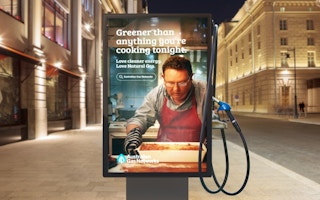The advertising business has received a stinging rebuke from the head of the United Nations for promoting fossil fuel brands, but the industry’s biggest agencies are showing no signs that they are willing to stop working for carbon-intensive energy clients.
To continue reading, subscribe to Eco‑Business.
There's something for everyone. We offer a range of subscription plans.
- Access our stories and receive our Insights Weekly newsletter with the free EB Member plan.
- Unlock unlimited access to our content and archive with EB Circle.
- Publish your content with EB Premium.
In a speech last week, delivered on World Environment Day, UN secretary general António Guterres called on the advertising industry to stop “acting as enablers to planetary destruction” by creating campaigns for Big Oil, which has earned a reputation for greenwashing its commitment to tackling climate change and delaying a pivot to clean energy.
Guterres said agencies should stop taking on new fossil fuel clients “from today” and draw up a plan to drop existing ones.
He said fossil fuel advertising should be banned, just as tobacco advertising has been restricted all over the world because of the health impacts of smoking.
Ad agencies pollute by driving consumption of carbon polluters. The world’s biggest six agencies wield the combined carbon footprint of the United Kingdom from just 39 clients, a study by non-profit Planet Tracker found earlier this year.
“
While most individuals inside the agencies are generally supportive of climate goals, they will keep taking the money as long as it is legal.
Belinda Noble, founder, Comms Declare for Climate
While a movement to push ad agencies away from dirty energy clients has gained some momentum in recent years, the industry’s biggest players – which control the lion’s share of the market – have resisted calls to clean up their client list.
None of the biggest agency brands – WPP, Interpublic Group, Omnicom, Dentsu, Havas and Publicis Groupe – were willing to directly comment on Guterrez’s remarks, in response to Eco-Business’ request.
WPP, the biggest ad firm, which works for the likes of ExxonMobil and Shell, pointed to its 2023 sustainability report in which it states that it seeks to “fairly represent” the commitments of its energy clients and will not take on any work that is “designed to frustrate the objectives of the Paris Agreement”.
The Paris Agreement aims to limit global warming to 1.5°C above pre-industrial levels by curbing fossil fuel consumption.
WPP, which owns agency brands including Ogilvy, Hill+Knowlton and Mindshare, also says it will only work with fossil fuel brands that have a net-zero target and a plan to transition to clean energy.
One of WPP’s largest energy clients, Shell, recently weakened a climate target to cut its emissions intensity and it is not aligned with the Paris Agreement.
IPG, which represents the likes of Saudi Aramco and Petronas, stated on its website in April that it has declined to work for dirty energy clients since it introduced a screening process in 2022 to filter out new clients that are not aligned with the Paris Agreement, do not report their emissions and are engaged with “controversial forms of oil and gas production.”
IPG client Petronas has received criticism for the weakness of its net zero target, which does not account for Scope 3 or full value chain emissions, including those related to the use of its products.
Both WPP and IPG, which handle more fossil fuel clients than any of their rivals, said that their stance on divesting from dirty energy advertisers is continually reviewed.
Won’t quit until it’s illegal
Belinda Noble, founder and head of Comms Declare, a non-profit that campaigns for agencies to drop fossil fuel clients, said that only once governments introduce a ban on fossil fuel advertising and sponsorships will agency majors stop working for Big Oil.
Edinburgh became the latest city to ban the advertising of fossil fuels in May, and joins other jurisdictions including Sydney, Amsterdam, Cambridge, Liverpool and Norwich to restrict the promotion of dirty energy. The Scottish capital also outlawed ads for cruise liners, air travel or sports utility vehicles.

Reuters ‘Sustainable Switch’ newsletter is sponsored by American Chemistry Council [click to enlarge]. Image: Reuters
“While most individuals inside the agencies are generally supportive of climate goals, they will keep taking the money as long as it is legal,” Noble told Eco-Business.
She said that in Australia, where she is based, there has been “zero public leadership” from big agencies, commercial media or advertising industry groups when it comes to calling out coal, oil and gas companies.
In his speech, Guterres also called on media companies to stop taking fossil-fuel advertising.
An investigation in December by DeSmog, a climate journal, found that brand studios at publications including Reuters, The New York Times, Financial Times and The Washington Post are creating a wide range of content for the oil and gas industry.
For example, the latest edition of Reuters’ ‘Sustainable Switch’ newsletter, which covered the news of António Guterres’ comments on ad agencies and media companies taking fossil fuel revenue, was sponsored by American Chemistry Council, a fossil fuel lobby group.








